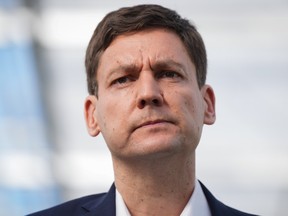Opinion: Diversion accounts for 50 per cent of safe supply drugs that police come across through seizures, Fiona Wilson, deputy chief of the Vancouver police, testified.

Article content
VICTORIA — Premier David Eby offered numerous excuses this week for the latest bad news about the NDP government’s troubled experiment with decriminalization and safer supply of illicit drugs.
He blamed COVID-19: “The implementation of decriminalization took place during the pandemic. There were significant and major decisions that had to be made in a short period of time.”
Advertisement 2
Article content
Article content
He blamed the police and the Opposition. “In terms of the implementation of this entire project, we did it with the support of the chiefs of police in the province. We did it with all-party support.”
He blamed the courts: “The B.C. Supreme Court says we can’t regulate hard drugs the same way we do alcohol or tobacco, which is an unusual decision and a troubling one for us.”
Indeed, Eby pointed at pretty much everyone except the New Democrats themselves for launching the project without the necessary preparation.
The premier was reacting to the devastating testimony at a federal parliamentary committee by Fiona Wilson, deputy chief of the Vancouver police, and Dwayne McDonald, deputy commissioner of the RCMP in B.C.
Both conceded that decriminalization has so far brought more negative impacts than positive ones.
McDonald: “Since decriminalization our overdose deaths have not decreased in B.C., nor have overdose rates.”
Wilson confirmed what the New Democrats have repeatedly denied, that there has been significant diversion of safe supply drugs to the illicit market. She testified that diversion accounts for 50 per cent of safe supply drugs that police come across through seizures.
Article content
Advertisement 3
Article content
The premier professed to be shocked by the news:
“The first time we’ve heard that data from the VDP was the presentation to the committee, so we are following up with the VPD on this,” the premier told reporters Tuesday. “We want to identify how and where it is being diverted so that we can minimize diversion.”
B.C. Public Safety Minister Mike Farnworth has repeatedly claimed that there is “no evidence of widespread diversion of safer supply drugs.”
In retrospect, the lack of evidence was probably a function of the government not asking for data on diversion of safe supply and not wanting to hear it when it did emerge from a growing number of police detachments and media reports.
Wilson, who is also president of the B.C. Association of Chiefs of Police, also discussed how decriminalization had tied the hands of police.
“There are many locations where we have absolutely no authority to address the problem of drug use,” she testified, referring to places that are now exempted from arrest for drug use and possession.
“If you have somebody who’s with their family at the beach and there’s a person next to them smoking crack cocaine, it’s not a police matter because a beach currently is not an exception to the exemption.
Advertisement 4
Article content
“These are all things that we raised prior to decriminalization taking effect that we don’t feel were adequately addressed,” added Wilson, by way of response to Eby’s insinuation that the police were fully behind the NDP government’s version of decriminalization.
Eby vowed renewed efforts to restrict public drug use where police are concerned. His government has so far been unable to produce legislation that could withstand a court challenge from advocates of more open drug use.
The province lost the first round when the B.C. Supreme Court granted a temporary injunction against implementing the law. It lost a second round when the court of appeal refused to lift the injunction.
Recently, the Eby government had to agree to extend the injunction to give its lawyers time to produce regulations that would address the objections of the court.
Nor did Eby’s legislation explicitly address the latest eruption over open drug use in the province’s hospitals. The New Democrats were initially in denial about that widespread practice as well. Then Health Minister Adrian Dix suggested establishing a safe consumption area in every hospital, only to back away from that notion the next day.
Advertisement 5
Article content
“There will be no provincewide mandate that every single hospital has to have a consumption area because every single hospital doesn’t have this issue,” explained Eby. “There is a rule in the hospital that you’re not allowed to smoke tobacco and you’re sure not allowed to smoke hard drugs. The health minister is working with experts to ensure that whatever needs to be in place is in place to ensure that the rules are followed by everybody.”
He left hanging how the rules will be enforced, given that police have already said there is no law against what is clearly happening in more hospitals than one.
Eby disavowed any intention of following the lead of Oregon, which recently abandoned a three-year experiment with decriminalization.
At the same time he hinted that the New Democrats might be having second thoughts about the experiment.
“All of us recognize that the program needs to respond and evolve to the concerns of British Columbians and what we’re seeing in communities,” he acknowledged.
Unless the premier can find better excuses for failure than the ones he voiced this week, don’t be too surprised if B.C. retreats from decriminalization before the election.
Advertisement 6
Article content
Recommended from Editorial
Bookmark our website and support our journalism: Don’t miss the news you need to know — add VancouverSun.com and TheProvince.com to your bookmarks and sign up for our newsletters here.
You can also support our journalism by becoming a digital subscriber: For just $14 a month, you can get unlimited access to The Vancouver Sun, The Province, National Post and 13 other Canadian news sites. Support us by subscribing today: The Vancouver Sun | The Province.
Article content





